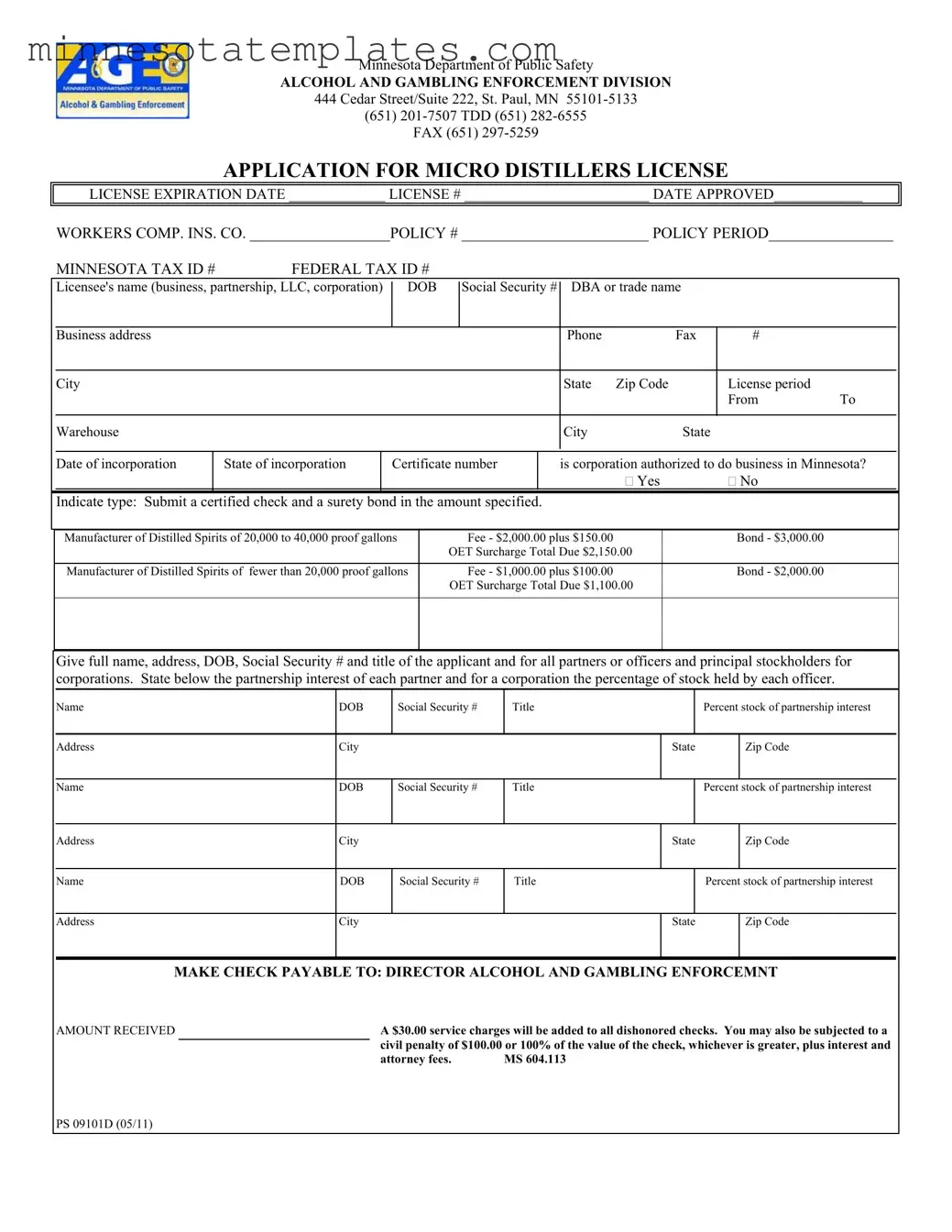Blank Ps 09101D Template
The Ps 09101D form is an essential document for anyone looking to obtain a micro distiller's license in Minnesota. This application is managed by the Minnesota Department of Public Safety's Alcohol and Gambling Enforcement Division. It collects vital information about the applicant, including their business structure, tax identification numbers, and contact details. Additionally, it requires details about the distillery's production capabilities and storage facilities, ensuring that applicants are prepared to meet state regulations. The form also addresses financial responsibilities, such as licensing fees and surety bonds, which vary based on the expected production volume. Applicants must provide information about partners, officers, and stockholders, along with any relevant permits. Furthermore, the form emphasizes the importance of product purity and mandates that applicants maintain testing records for inspection. Completing this form accurately is crucial, as any false statements can lead to rejection or revocation of the license. Overall, the Ps 09101D form plays a critical role in regulating the micro distilling industry in Minnesota, ensuring both compliance and safety for consumers.
Key takeaways
Filling out and using the PS 09101D form is a crucial step for those seeking a micro distillers license in Minnesota. Here are key takeaways to keep in mind:
- Accurate Information: Ensure all information provided is accurate and complete. Inaccuracies can lead to delays or rejection of your application.
- Application Fees: Be prepared to pay the required fees and submit a surety bond, as outlined in the form. The total due varies based on production capacity.
- Proof Gallons: Clearly state the number of proof gallons you plan to produce annually. This information is essential for determining your license type and fees.
- Storage and Facilities: Describe your storage and warehousing facilities thoroughly. Include details about your bottling and production capacity.
- Testing Records: Maintain records of periodic batch tests to ensure product purity. These records must be available for inspection for at least two years.
- Partnership and Corporation Details: Provide complete information about all partners or corporate officers, including their ownership percentages and titles.
- Legal Compliance: Disclose any past indictments or convictions related to liquor control laws. This information is critical for your application’s consideration.
- Wholesaler Information: List all Minnesota wholesalers associated with your business. Attach additional sheets if necessary.
- Permanent Records: Understand that all submitted documents become part of the permanent record. Ensure that all statements are truthful to avoid penalties.
By following these key points, you can navigate the application process more effectively and increase your chances of obtaining the necessary license.
Misconceptions
Here are some common misconceptions about the Ps 09101D form used for applying for a micro distiller's license in Minnesota:
- Misconception 1: The Ps 09101D form is only for large distilleries.
- Misconception 2: You don't need to provide personal information.
- Misconception 3: The application can be submitted without a fee.
- Misconception 4: The license is automatically renewed.
- Misconception 5: You can ignore the testing requirements for product purity.
- Misconception 6: You can submit false information without consequences.
- Misconception 7: The Ps 09101D form is the only requirement for operating a distillery.
This form is for both small and large distilleries. It caters to manufacturers producing fewer than 20,000 proof gallons as well as those producing 20,000 to 40,000 proof gallons.
Applicants must provide personal details, including names, addresses, and Social Security numbers for all partners or corporate officers. This information is crucial for the approval process.
A fee is required with the application. The amount varies based on production capacity, so it’s essential to check the correct fee before submission.
Licenses must be renewed regularly. Applicants should be aware of the expiration date and ensure they submit renewal applications on time.
It's the applicant's responsibility to ensure the purity of the product. Regular batch tests must be conducted, and records should be kept for at least two years.
Submitting false information can lead to rejection or revocation of the license. Honesty is essential throughout the application process.
While the Ps 09101D form is critical, applicants may also need additional permits and licenses depending on their specific operations and local laws.
Additional PDF Templates
Mn New Hire Reporting - Information from this form is submitted electronically or via fax for convenience.
The proper completion of the ST-12B Georgia form can greatly enhance the likelihood of a successful refund for sales tax paid on purchases. For further guidance and resources concerning this affidavit, individuals may find it helpful to visit Forms Georgia, which offers essential information to facilitate the understanding of the form's requirements and streamline the overall process for taxpayers in Georgia.
Minnesota Tax Forms 2022 - Line 2 adds Minnesota withholding and credits from specific lines of Form M1.
Mn Repo Laws - The application must be filed with the appropriate office as directed.
